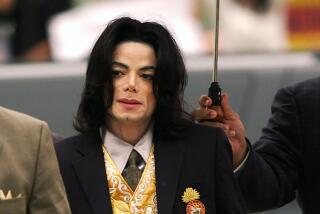Jackson Due to Reap $3.5-Million Advance From Sony
Facing arraignment today on child molestation charges, pop star Michael Jackson is about to hear some badly needed good news on the business front.
Jackson is due to receive an estimated $3.5-million advance in coming weeks for his forthcoming boxed-set compilation under his long-standing contract with Sony Corp.’s record unit, according to sources familiar with his business affairs.
On top of that, the singer is poised in as little as a year to begin collecting royalties that could total $5 million annually if his recordings keep selling, according to the sources.
The royalties are in prospect because Jackson’s record sales -- strong abroad, despite a sharp drop-off in the U.S. -- are nearing the point at which the tens of millions of dollars Sony has spent on Jackson over the years will be paid off.
To be sure, Jackson’s overall finances remain tenuous. About $270 million in loans from Bank of America Corp., backed by his two major song catalogs, will come due in several years. And, after frittering away millions on poor investments and a shifting cast of business associates, he continues to spend lavishly.
But with the anticipated Sony advance, and a recent refinancing of his debts, the erstwhile king of pop will be turning a financial corner.
The Sony payment will come in exchange for delivery of recordings and other materials for the boxed set, which Sony is aiming to release for the fall -- probably before any verdict in the Santa Barbara molestation case.
Jackson recently obtained an extension on one loan, a $70-million package backed by his Mijac publishing company, until early 2006, sources said.
Representatives of Sony Music Entertainment declined to comment.
Jackson’s representatives declined to discuss his finances. But his longtime music attorney, John Branca, said it would be a mistake to count his client out.
“He was counted out once before, when the Jackson Five lost popularity and came back bigger than ever,” Branca said. “Michael speaks to a worldwide audience like no other artist in history.”
Although Jackson’s U.S. sales have slipped from their 1980s apex, the singer’s catalog and recent greatest-hits CD have sold so strongly worldwide in recent years that he is edging toward paying off the millions of dollars in recording and promotional expenses owed to Sony before he can collect a paycheck.
With Jackson’s release of 2001’s “Invincible” album, Sony reissued much of the singer’s earlier material and found worldwide demand. Since then, Jackson’s albums have sold about 14 million copies worldwide, with about 9 million sold outside the U.S., sources said.
Already, Jackson has whittled down a balance that stood at about $40 million several years ago. If sales hold up enough to finish off the tab, he would begin pocketing royalties from each album sold in the future.
Some sources familiar with Jackson’s record contract suggest that he could finish repaying the advances by early next year, although others predict that it could take longer, perhaps three years or more.
The biggest factor in Jackson’s financial fate, however, is whether he can cut lucrative future deals.
“It’s all going to come down to what happens in the next 12 months,” said one music industry player close to Jackson. Even if Jackson is acquitted of the criminal charges against him, “you don’t know how tarnished he’s going to be.”
Associates insist that Jackson could still earn a fortune by touring internationally.
“Those people talking about doomsday, don’t they realize the guy could go out and do 10 or 15 dates and he would make tens of millions of dollars?” said veteran music executive Charles Koppelman, who ranks among the singer’s top counselors.
Television specials may also provide cash. Jackson reportedly earned millions from TV appearances last year. But at least two networks recently turned down his pitch for a special on his charitable efforts toward the AIDS epidemic in Africa.
With Jackson’s 1991 Sony contract nearing its end, he will be free to seek a new label deal, though any new pact probably would be more modest than the old one. The boxed compilation and a planned “best of” collection are the final releases under the Sony agreement.
Given the uncertainties, however, Jackson’s best prospects rest on continued income from a spate of mega-deals Branca and others made during the star’s ascent after the success of his 1982 blockbuster, “Thriller.”
Jackson paid $47.5 million in 1985 to acquire a firm that held the Beatles’ publishing rights -- one of the richest song catalogs in music -- and began snatching up other copyrights.
Ten years later, Jackson struck a deal to merge those rights with Sony’s publishing unit, creating a new firm, Sony/ATV. That deal paid him more than $100 million in cash, and he received a stake in the combined company.
Meanwhile, Jackson had bulked up his own publishing firm, Mijac, which holds rights to his personal hits, by buying songs that include the Sly and the Family Stone catalog and Curtis Mayfield’s “People Get Ready.”
Sources estimate the Mijac firm returns profit to Jackson of $6 million or more a year. A sale of Mijac probably would fetch at least $75 million, industry sources say.
Sony/ATV, for its part, generates profit for Jackson in the same range. His stake in the unit is worth perhaps $400 million or more, sources say.
Advisors vow Jackson won’t sell one of his publishing firms to pay debt. As it stands, income from the catalogs should cover interest and some of the principal on his loans, sources said.
The expectation that Jackson may soon receive record royalties despite the enormous advances under his Sony contract stems from the unusually favorable partnership he struck with the company at the peak of his fame. Under the arrangement, Jackson receives half of what Sony earns on his music, in addition to an estimated 25% royalty rate, sources said.
Most acts sign deals with a 12% royalty, and although some of the biggest stars earn far higher rates, none is known to receive a royalty and a profit split.
Jackson also became one of a handful of superstars to get so-called reversion rights to their recordings, sources said. That means in roughly seven years Jackson will have the ability to distribute his own greatest-hits packages or license them to one of Sony’s competitors.
“The truth is, the longer he holds on, the more valuable” his recording and publishing assets could be for him, said one person familiar with Jackson’s finances. “Holding on is the trick.”
Times staff writer Geoff Boucher contributed to this report.
More to Read
The biggest entertainment stories
Get our big stories about Hollywood, film, television, music, arts, culture and more right in your inbox as soon as they publish.
You may occasionally receive promotional content from the Los Angeles Times.










